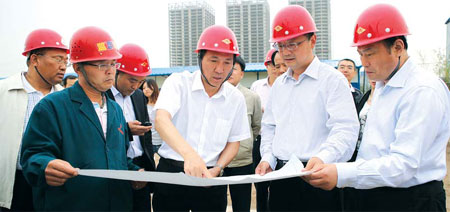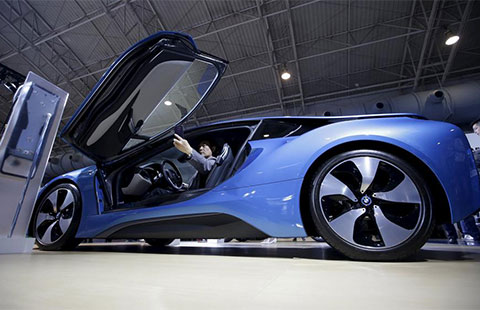Logistics park creates new links out west
By Lu Hongyan and Wang Xiaodong (China Daily) Updated: 2012-10-12 08:03
|
Han Song (second right), deputy mayor of Xi'an and Party chief of the Xi'an International Trade and Logistics Park, inspects a key project in the park. The park's leadership vowed to make a greater economic contribution to the city. |
With the goal of becoming China's largest international inland port, the park can greatly increase the development and openness of the western areas, Han said.
A graduate of a top university of foreign trade, Han is very familiar with foreign trade and business, and he has a profound understanding of the field.
The 47-year-old deputy mayor can speak fluent English and took part in the WTO negotiations when he worked in the State Council.
His experience working in the State Council, the Ministry of Commerce and State Industry and Commerce Administration helped Han to be successful at attracting investment to Xi'an after he became the deputy mayor in 2006.
In the past years, Han made great contributions to the city's export-oriented economy and created the largest inland port in West China, which has greatly improved the city's investment environment and attracted a number of large international enterprises and projects into Xi'an, such as the grand Samsung project.
China's eastern coastal areas developed rapidly in the three decades that have passed since China adopted the reform and opening policy. Proximity to seaports played an important role in the process.
Because Xi'an is the economic center of western China and the largest hub city on the Chinese section of the Euro-Asia railway bridge, building an inland port there will promote an open economy in the whole western area and encourage the development of an outbound economy, Han said.
Since the Xi'an International Trade and Logistics Park was set up in 2008 in Xi'an, capital city of China's Northwest Shaanxi province, an inland international port has taken shape and is running smoothly.
Foreign trade volume in the park has been increasing at an annual rate of more than 50 percent. Port-based economy has also developed. The park played a role in attracting investment from some of the world's top 500 enterprises.
The inland port functions through the synergy of three projects - the Xi'an Railway Container Transport Center, the Xi'an Comprehensive Free Trade Zone and the Xi'an highway hub.
The Xi'an Comprehensive Free Trade Zone enables northwestern China to have the same advantages in processing trade and free trade logistics that coastal ports have, which has reduced the cost of and time needed for foreign trade done in inland China.
Meanwhile, it also provides favorable conditions for inland areas to develop an outbound economy and modern services, such as international trade and outsourcing.
The Xi'an Railway Container Transport Center project is a key link that allows China to promote international container transport in inland China. It will facilitate good transport and reduce losses and the cost of transportation for enterprises.
The Xi'an highway hub project can integrate such functions as transportation management, shipment, logistics and information, and it can provide comprehensive services for logistics enterprises in the region.
It has been listed by the Ministry of Transport as a large national road transport hub.
Functions of the three projects are integrated through information technology and act as the core of the Xi'an International Trade and Logistics Park.
By taking advantage of the advanced transportation of Xi'an, the trade and logistics park has also established strategic relations with some major coastal ports, such as those in Shanghai, Tianjin and Lianyungang in eastern China, and the border ports of Horgos and Alataw Pass in the Xinjiang Uygur autonomous region in western areas of China.
This vast and well-connected logistics network will effectively increase the openness of the northwestern region, promote the development of an outbound economy in the region and increase competitiveness of local industries in the international market.
The development of the trade and logistics park will bring benefits to all of western China and Xi'an in particular. It will greatly facilitate international trade for the city and breed a port-based economic area, which will help the city to attract international investment and promote its own enterprises to the world.
After the park is completed, it will become a world-class modern service industry zone in western China, and the service industry will account for a significant share of Xi'an's economy. The city will become China's biggest inland international port city and join the club of international metropolises.
In addition, the environment for foreign trade and investment in the whole western area of China will be improved.
This will bring opportunities for the creation of an outbound economy.
The park will open up inland China and bring about all-around economic development in the region.
- China economy stabilizing, additional policy support possible: report
- Chinese car firms gain greater overseas foothold
- E-Class L heralds new decade of development for joint venture
- Both patents in copycat suit canceled
- China and Germany expand NEV cooperation
- Passenger car sales exceed expectations
- Global investors ride out MSCI snub
- Large shareholders selling spree spooks retail investors



















